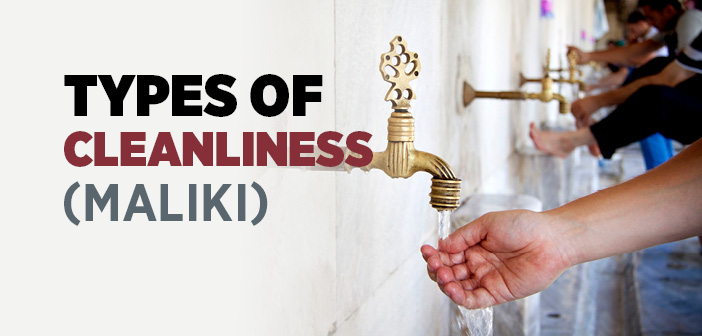What type of cleanliness in islam?

I. Spiritual Purity
Just as cleanliness of the body and clothing is important, so too is cleanliness of the heart and soul. For the purpose of purifying the heart and soul, Islam has ordered the avoiding of sins and evil, alongside behaviour that is not islamically appropriate.
For deeds to be acceptable and valid by Allah, the first condition is that the person’s faith is complete. Faith is a form of spiritual purification, contrary to falsehood, which is spiritual impurity. Nifaq and shirk are also spiritual najasah. One who has no faith is doomed to misfortune in this world and likewise eternal doom in the hereafter. Purifying oneself from evil and placing the belief in Allah in one’s soul is the foremost condition for happiness in this world and the next. Allah says in the Qur’an: “He has succeeded who purifies (his soul) and he has failed who corrupts it.”[1] This ayah indicates the importance of spiritual purification in Islam.
There are two forms of spiritual purity:
- Purity of the heart: This is keeping the heart pure from corruption, being sincere and firm in one’s faith and pursuing pure intentions.
- Purity of morals: Purity of morals is avoiding bad behaviour that is not appropriate in Islam. Being good and polite to others, sharing others’ happiness and grief, being righteous and truthful at all times, benefiting from Allah’s bounties in the right manner, avoid harming creatures, abstaining from evil and sins, are all part of being pure in terms of morals.
One with good morals is loved by Allah and by other people. People as such remain respected citizens within society.
II. External Purity
- Purity of the body: Cleansing of any impurities or dirt in the body is essential. Cleaning of the hair, nails, brushing teeth and washing hands and mouth before and after meals are all considered steps of purifying the body.
- Purity of clothing: Keeping the clothing clean is also important in terms of preventing bacteria and diseases from breeding on the fabric and one’s body. Keeping clothing clean is just as important as keeping the body clean.
Wearing clean clothing is a person’s responsibility towards himself and those around him. Thus, one does not wear dirty and untidy clothing; he should be presentable at all times. A person who wears clean and tidy clothing is also regarded a notable person by others.
- Environmental cleanliness: Keeping the environment clean includes hygiene of homes, schools, workplaces, streets, air and purity of the water.
Cleanliness of the environment is also very crucial for health; especially that of the air and water, they must be free of any harmful chemicals or substances.
III. Legal Purity (Both External and Spiritual)
Circumstances that require performing ablution or ghusl are called states of hadath, which is legal impurity. One who requires wudu’ or ghusl is physically clean however he or she is considered legally impure until wudu’ or ghusl is performed. This is why it is not appropriate to stand before Allah in such a state of impurity.
By performing wudu’, organs that are most frequently used such as hands, arms, face, feet, mouth and nose are cleansed. Likewise with ghusl, the whole body is cleansed and purified, thus ensuring physical purity as well as legal purity (hukmi). Healthy skin is also maintained through cleansing it.
Legal purification is carried out with water. If no water is available, soil is used (tayammum). A person must be free of physical and spiritual impurities to pursue an orderly life in this world and bliss in the hereafter.
[1] Surah Shams, verses 9-10
Source: Fiqh1 (According To The Maliki School Of Islamic Law), Erkam Publications





